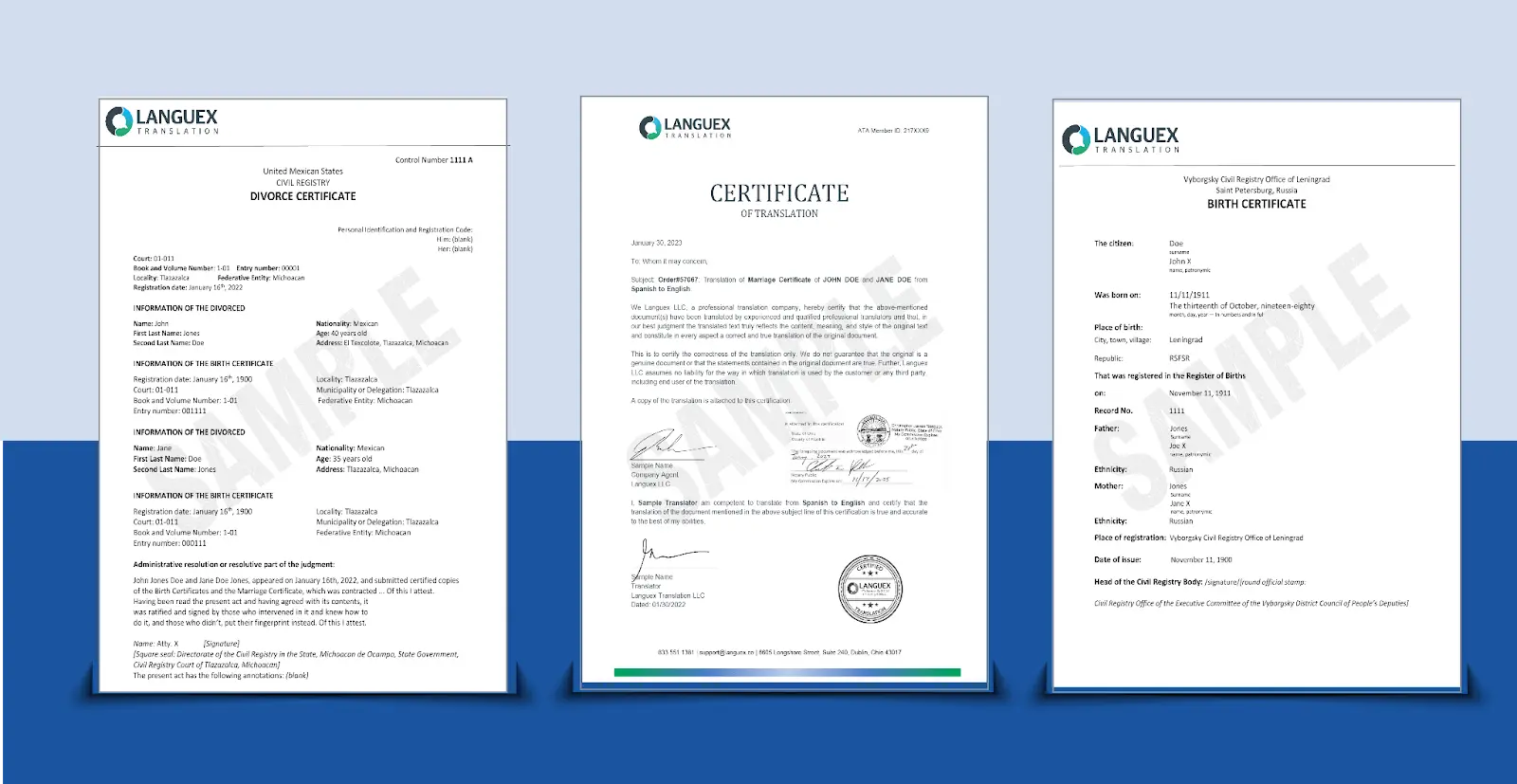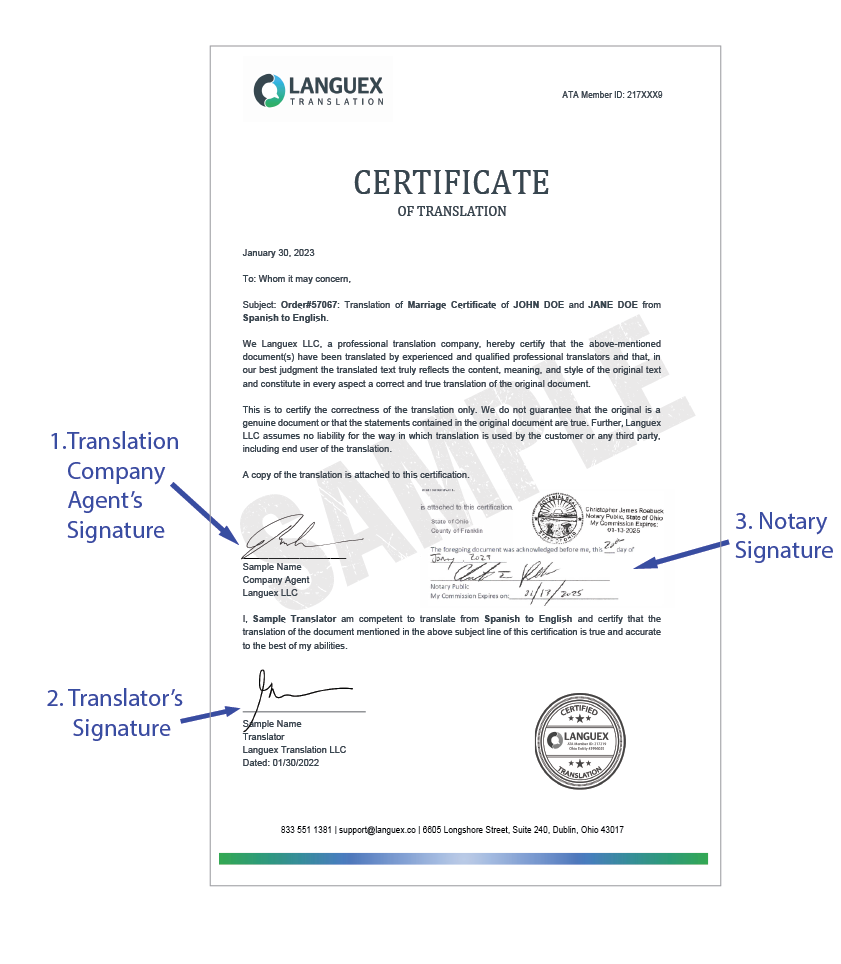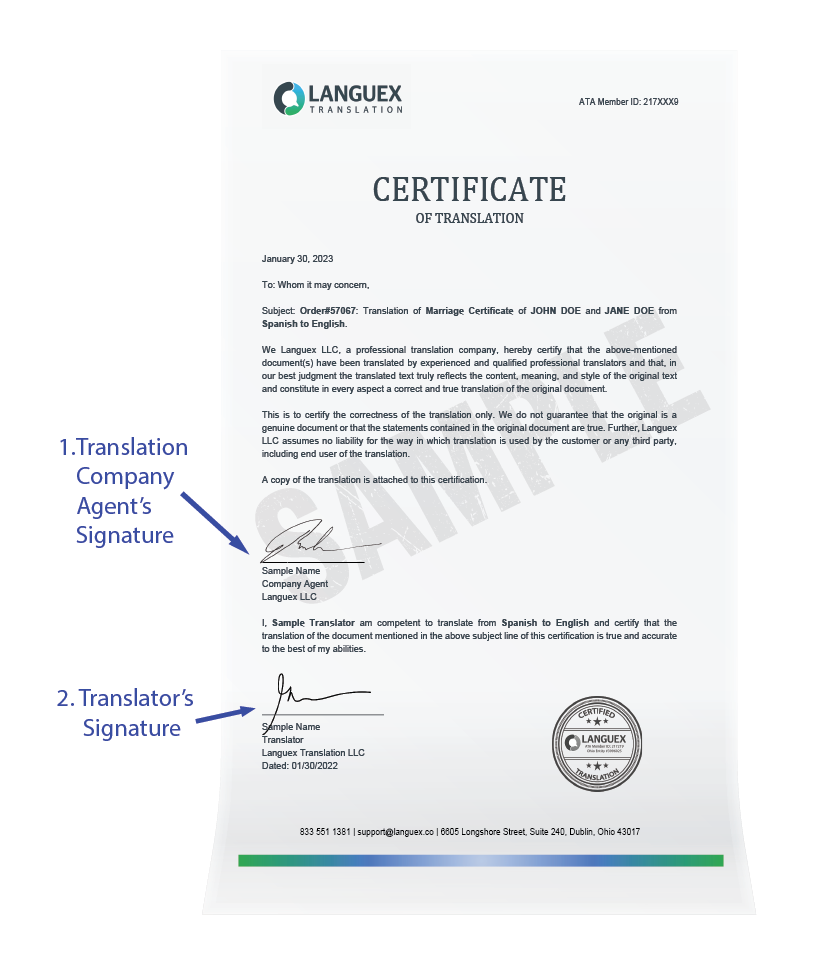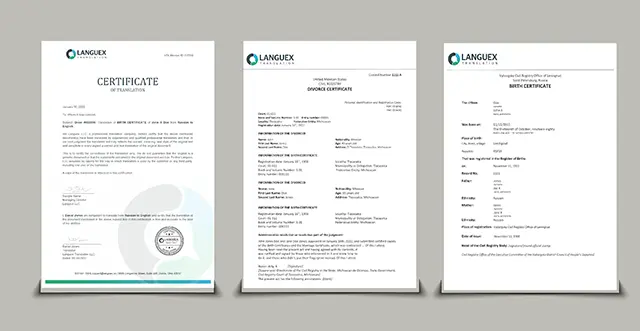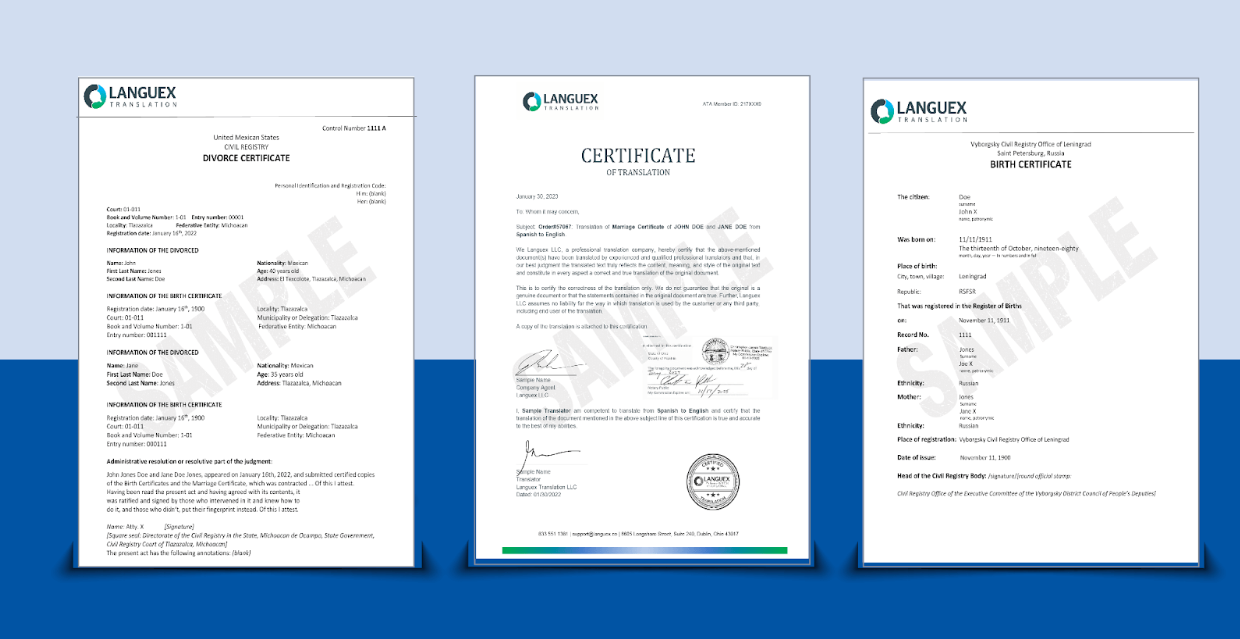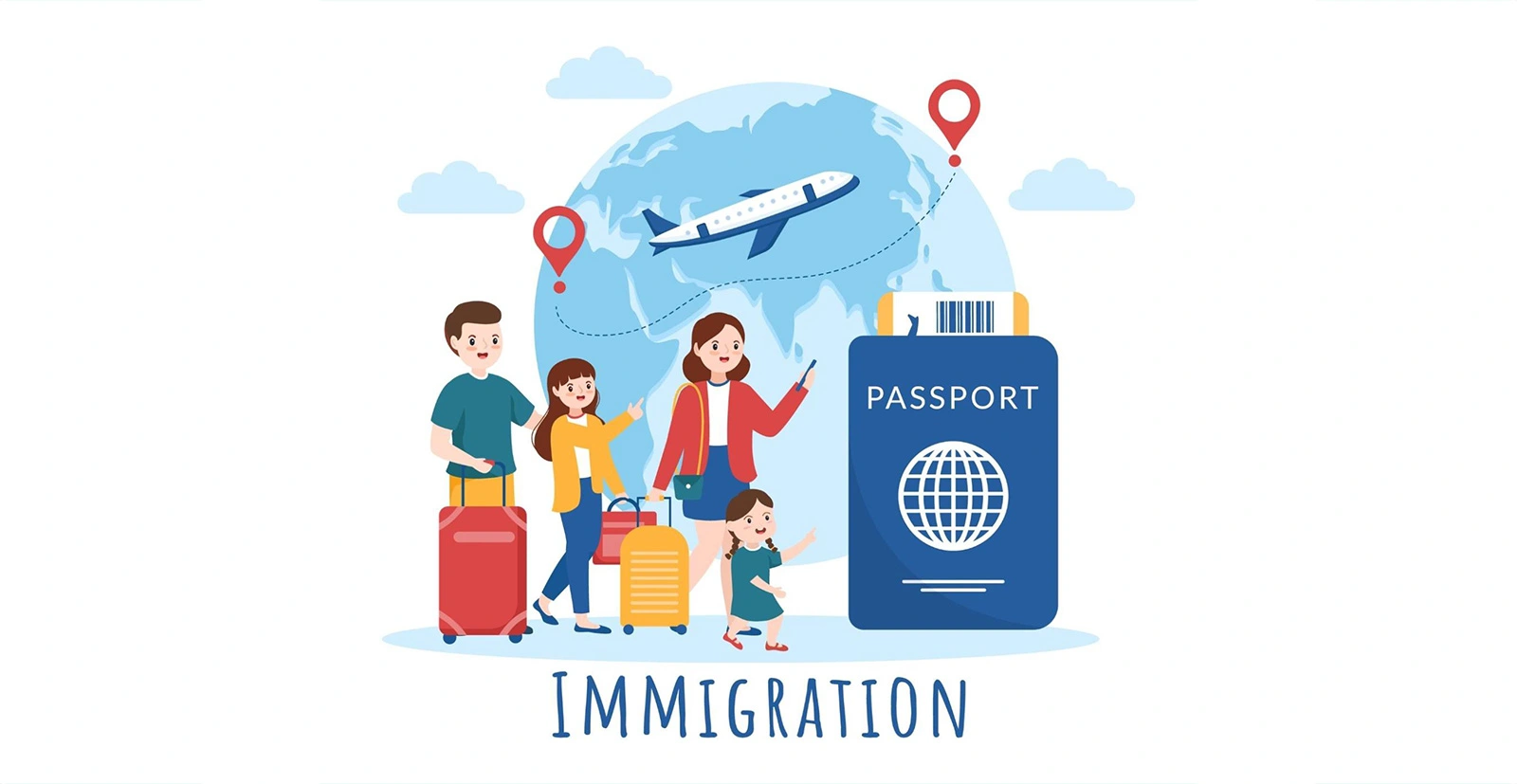Everything You Need to Know About Notarized Translation
Certified translations have been completed by a skilled and authorized translator and are legally recognized. Governmental organizations, educational institutions, and commercial enterprises frequently utilize these translation services to confirm the authenticity and accuracy of the materials being given.
A notarized translation service is an essential aspect of the certified translation process. Notarized translations are critical in many fields, particularly legal proceedings, state and federal government, immigration, academics, and international business. This topic is important for individuals, organizations, and companies requiring certified and notarized document translation. Languex provides you with a comprehensive understanding of notarized translation services.
It is essential to select the best-certified translator because good or accurate translations can cause expensive delays. With quick response times, excellent customer service, and high-quality and precise translations, Languex is a reputable and trustworthy certified translation service.
Rest easy knowing that your official documents are in good hands by choosing Languex for your certified translation.
Key Takeaways:
- A notarized translation is a document translated from one language to another signed, stamped, and verified by a notary public and the translator.
- Notarization merely certifies the translator’s identity, not the translation’s quality.
- A notarized translation is a certified translation that includes a signature and seal from a notary public, while a certified translation is signed and stamped by a professional translator.
- The notarized translation process involves finding a qualified translator, obtaining a quote, reviewing the translated document, having the document notarized, and receiving the notarized translation.
- To get a document translated and notarized into English, reach out to a translation company and provide the document, receive a quote, and have the document translated into English and notarized.
Table of Contents:
What is a Notarized Translation?
A notarized translation is a document translated from one language into a second language. The translation is signed and stamped by a notary public and the translator. The notary public includes their seal and the date of the notarization attesting to the authenticity of the translator’s signature.
The notarization does not attest to or affirm the quality of the work done by the translator; it only verifies the identity of the certified translator who signs the notarized certificate of translation.
Sample of a Notarized Translation Certificate
Is a Notarized Translation the Same as a Certified Translation?
A notarized translation is a certified translation, but the main difference between a certified and a notarized translation is that certified translations are signed and stamped by a certified translator. In contrast, a notarized translation is signed and stamped by a certified translator and a notary public.
A notarized translation is a translation signed and stamped by a notary public in addition to the translator. The notary agent also includes their seal and the date of the notarization on the document attesting to the authenticity of the translator’s signature.
Certified translation services refer to the translation of a document stamped and signed by a professional translator to certify that it is a word-for-word translation of the original document. Certified translations are often required for official documents.
Here is an example of a standard translation certificate vs. a notarized translation certificate.
How is a Translation Notarized?
The process of obtaining a notarized translation typically involves the following steps:
- Find a qualified translator: Look for a professional notarized translation company that is qualified to translate the document and has experience with notarized translations.
- Request a quote or place an order online: Contact the translation company and provide them with the document that needs to be translated. Ask for a quote or place an order online for the translation and notarization services.
- Review the translated document: Once the Translation is complete, review it to ensure that it is accurate and meets your needs.
- Notarize the translation: Once you are satisfied with the translation, the translator will take the document to a notary public to be notarized. The notary will verify the translator’s identity, certify the translation is accurate, and affix their seal and signature.
- Return of the translated document: The translator or the notary will return the notarized translation to you.
How to notarize a translated document
Here’s how Languex certifies and notarizes a translated document:
- Professional translators at Languex will translate your document in the target language with precision and clarity.
- An accuracy certificate from the translator attests to the translation’s true and accurate portrayal of the original text.
- Languex notarizes the translated document by working with notaries who witness the signing and affix a notarial seal to the document.
- Languex confirms the qualifications and validity of its translators and notaries by checking their credentials.
- The quality control procedure at Languex ensures the translation is correct, the notarization is done properly, and you’re happy with the result.
How can I get a document translated and notarized into English?
Follow the directions below to have a document notarized and translated into English by Languex:
- Contact Languex to get a price quote for translation and notarization services. You can reach Languex by phone, email, or through their website.
- Once the estimate has been confirmed, you’ll upload a copy of the document you want to be translated and notarized. A certified copy of the original document must be provided to Languex if it was originally written in a language other than English.
- The document will be translated into English by Languex, who will ensure the translation is precise and of the highest caliber.
- Notarization: After the translation is finished, a notary public will attest to the signature of the certified translator and issue their official stamp and signature.
- Documents are then returned to you by Languex after being translated and notarized.
It is crucial to remember that the procedure for getting a document notarized and translated may differ based on the particular needs of the document and the jurisdiction in which you are located. To make sure that the procedure is carried out successfully and efficiently, Languex can offer direction and assistance.
How Much Does a Notarized Translation Cost?
The cost of a notarized translation varies depending on factors such as the document’s length, the subject matter’s complexity, and the translator’s qualifications.
Languex, a professional translation agency, offers notarization services for $19.95 per translation certificate. This is for notarization; there is an additional cost to translate the document, which is $24.50 per page; we offer certified translation services in 65+ languages.
The notarization option can be selected when ordering your document translations from the Languex website.
Languex has designed a 3-step, error-free, fast online ordering process. Notarization takes less than 24 hours.
Languex provides bilingual translators experienced in performing certified translations for financial services, medical records, business documents, personal papers, academic records, vaccination records, and more. Their translators are vetted and certified in over 65+ languages. Languex’s ordering process is fast, affordable, and secure.
Why Are Notarized Translations Important?
Notarized translations are important for several reasons:
- Legal validity: Notarized translations are often required for official documents, such as immigration papers, academic transcripts, and legal documents.
- Professionalism: Notarized translations are performed by qualified professional translators whose signature is authenticated by the notary public.
- Security: Notarized translations are often used for sensitive and personal information, like medical records and personal identification documents.
- Recognition: Notarized translations are recognized by government agencies, courts, and other organizations.
When Do You Need a Notarized Translation?
A notarized translation is often required for official and legal documents in which the translation needs to be authenticated by a government official; some examples include
- Legal proceedings: Notarized translations are required for many legal documents, such as birth certificates, marriage certificates, and divorce decrees, used in court cases or other legal proceedings.
- Immigration: Notarized translations may be required for immigration-related documents, such as passports, ID cards, and visa applications, submitted to government agencies or consulates.
- Education: If you are applying to a school or university in a foreign country, you may need to have your academic transcripts translated and notarized.
- Healthcare: Some countries require that medical records be translated and notarized to be considered by medical institutions.
- Businesses: Many businesses may require notarized translations of contracts, financial statements, and other official business documents to conduct international transactions.
- Technical or scientific documents: Some scientific or technical documents may require notarized translations for patent applications, research papers, and other official documents.
- Personal documents: Some documents, like certificates of achievement and diplomas, may also require notarized translations.
- Government agencies: Some agencies and organizations may require notarized translations of submitted documents.
Where Can I Get a Document Translated and Notarized?
We at Languex know how important it is for you to feel confident in the accuracy of your translated and notarized documents. We can translate all kinds of documents, including:
- Court records
- Certificates of birth and decease
- Marriage certificates, divorce judgments, and other proofs of marital status
- Diplomas and academic records
Does USCIS Require a Notarized Translation?
The United States Citizenship and Immigration Services (USCIS) does not generally require notarization for most documents submitted with immigration applications and petitions.
It is always recommended to check the specific requirements for the type of immigration application or petition submitted and to contact USCIS if you have any questions about the notarization requirements for your specific case.
Can I Translate and Notarize My Documents?
Translating a document requires a high level of language proficiency and knowledge of the subject matter. Translating your own document may result in errors or inaccuracies, which could have legal or financial consequences.
As for the notarization, notaries are not authorized to notarize documents they have translated themselves. Notaries must be impartial and unbiased in their work; notarizing a document they translated would be a conflict of interest.
Can I notarize the translations I make myself?
No, according to the American Notary Association, a notary public cannot act as a notary public and a translator simultaneously on the same document. After the completion of the translation from one language into another language, the translator prepares a statement certifying that the translation is true and correct, which is generally notarized by another notary.
Should I Use a Professional Certified Translation Service for Notarized Translations?
Yes, you should use a professional translation company; notarized translation service companies have more resources and experience handling notarized translations and have the qualifications and experience to provide an accurate translation.
They can handle the entire process of translation and notarization, from translating the document to taking it to get it notarized. These companies typically employ professional translators qualified to translate various documents and have experience with notarized translations.
In conclusion, Languex Certified Translations and Notarization services are a reliable and skilled option for those people and businesses needing official translations and notarizations of their crucial papers. Languex offers precise and high-quality translations, supported by their dedication to quality and client satisfaction, thanks to a team of qualified and experienced translators.
Languex offers the knowledge and resources to satisfy your demands, whether you need a personal document translated for immigration reasons or a corporate document translated for an international presence. By selecting Languex, you can be sure that your translation and notarization requirements are in good hands and that you will get the assistance you need to complete the procedure successfully.
What a notary public can and can’t do in certified translation
A state-appointed notary public witnesses document signings and administer oaths. Their main job is to confirm a document’s signer’s identity and authenticity. They can verify certified translations but need to perform them. A document can only be certified by a professional translator in both languages. After translating the document, the Notary can notarize it to verify its accuracy.
Can a notary translate documents?
Yes, a notary agent may serve as a translator; however, a notary may not notarize his or her translation. If a notary serves as a translator, he or she cannot serve as a notary simultaneously on the same document.
Can a Notary Public Certify and Notarize a Translation?
It’s important to note that a notary public doesn’t verify the quality of the translation; they only verify the translator’s identity. A notary public swears the translator’s identity is valid they then sign and puts their official seal on an affidavit. As long as the translator believes the work is accurate and complete, the oath they sign is considered enough evidence of authenticity.
A certified translator cannot notarize their signature, and a notary public cannot notarize their signature as a certified translator.
Why aren’t notaries authorized to certify document translations?
Notaries are unable to confirm translations for two reasons. No state in the United States permits Notaries to certify translations as a legal act. A declaration stating that the translation is correct must also be signed by the translator and notarized to certify the translation. You would be notarizing your signature if you, the notary, were also the translator.
If you are an experienced professional translator who also holds a Notary commission, keep in mind that you would need to locate another Notary to notarize your signature on the translator’s declaration if you were to translate a document. There is no state or region in the United States where it is legal to notarize your signature due to a conflict of interest.
Can you notarize another translator’s signature?
No. However, you may notarize the translator’s signature on the statement if requested if another translator drafts and signs a translator’s declaration attesting to the accuracy of a translation.
Make careful to follow all the legal requirements in your state for the proposed notarization. For instance, for a translated real estate or personal property document to be recorded in Texas, its accuracy must be sworn to before a Notary or other officer authorized to administer oaths (Property Code 11.002). In this situation, a Texas notary would have to conduct a jurat rather than an acknowledgment.
When asked to execute a jurat for a translator’s declaration in California, notaries must ask the translator for sufficient identification documentation and administer an oath or affirmation to the translator.
Where to get a birth certificate translated and notarized?
Your birth certificate can be translated and notarized with the aid of Languex, a reputable translation and notary service. They provide a complete and practical solution, from translation to certification and notarization, guaranteeing the legitimacy and acceptance of your birth certificate by the appropriate authorities.
With Languex, you can have peace of mind knowing that your birth certificate will be accurately translated and notarized by licensed specialists, resulting in a stress-free experience.
Conclusion
For both people and companies, certified translation and notarization services are essential for confirming the validity and authenticity of important documents. By choosing a qualified and experienced certified translation service, you’ll have confidence that your documents will be translated and notarized per the relevant regulations.
Order trusted and professional Certified & Notarized translation
